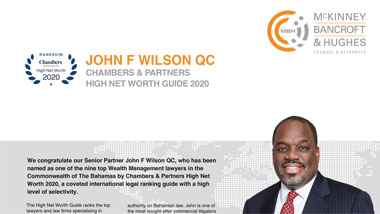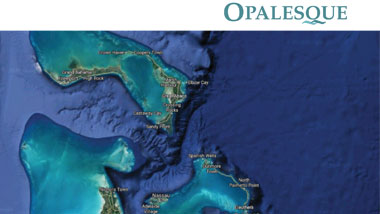John F Wilson K.C. – Chambers & Partners High Net Worth Guide 2020
We congratulate our Senior Partner John F Wilson K.C., who has been
named as one of the nine top Wealth Management lawyers in the
Commonwealth of The Bahamas by Chambers & Partners High Net
Worth 2020, a coveted international legal ranking guide with a high
level of selectivity.

Opalesque Roundtable Series ’20 BAHAMAS
Well before the Second World War, The Bahamas was already seen as a desirable place for persons with wealth to come and live. The Bahamas’ financial services industry didn’t come first: what really came first were those persons of mobile capital and being able to afford to live at a place of their choosing. Almost 100 years later, the country is very mature in having maintained and expanded its financial services infrastructure, while, of course, still being an obvious place for persons choosing to relocate for many reasons, whether it be the expertise offered to support wealth management, climate, lifestyle or just simply the location. The Bahamas is in close proximity to major centers around the world and midway between Latin America and North America. Insiders report a steady influx of family offices setting up in The Bahamas.

Sustaining Business Longevity
The legislative updates have also led to the eradication of marketing barriers which open the door to considerable potential expansion. Kevin Moree, partner at McKinney Bancroft & Hughes, explains: “As the investment fund legislation in The Bahamas is now fully compliant with the Alternative Investment Fund Managers Directive of the EU, there should no longer be any restrictions for marketing Bahamian investment funds to investors in the EU. It is now also possible for Bahamian companies to manage alternative investment funds established in a member state of the EU, subject to obtaining the appropriate licence from the Securities Commission.
Full magazine link

Implementation of FATCA and CRS in The Bahamas
By Beatrice Miranda & Kevin Moree
The Hiring Incentives to Restore Employment Act of 2010 added chapter 4 of subtitle A, comprised of sections 1471 – 1474, to the Internal Revenue Code of the United States. Chapter 4 is known as the Foreign Account Tax Compliance Act (“FATCA”), which addresses non-compliance by U.S. taxpayers who are holding foreign financial accounts or assets. FATCA also requires certain foreign financial institutions (“FFIs”) to report to the IRS information about financial accounts held by U.S. taxpayers or foreign entities in which U.S. taxpayers hold certain ownership interests.
In order to facilitate the provision of information on financial accounts held by U.S. taxpayers abroad, the U.S. Treasury Department collaborated with foreign governments to develop model intergovernmental agreements, which are intended to provide an effective and efficient means for complying with FATCA, while reducing the burden which FATCA compliance imposes on FFIs.
The Agreement between the Government of the Commonwealth of The Bahamas and the Government of the United States of America to Implement FATCA was entered into in November 2014, and The Bahamas and the United States of America Foreign Account Tax Compliance Agreement Act, 2015 (the “FATCA Act”) came into force the following year. Under that Act, FFIs report certain information on U.S. reportable accounts maintained by them to the Competent Authority in The Bahamas, which automatically provides such information to the Competent Authority in the United States.
The OECD’s Common Standard on Reporting and Due Diligence for Financial Account Information (“CRS”) was implemented in The Bahamas by the Automatic Exchange of Financial Account Information Act, 2016 (the “CRS Act”) and the Automatic Exchange of Financial Account Information Regulations, 2017 (the “CRS Regulations”). Both the CRS Act and the CRS Regulations were subsequently amended. Under the CRS, participating jurisdictions obtain specified financial account information from their financial institutions and automatically exchange such information with reportable jurisdictions on an annual basis.
While the FATCA Act only applies to the automatic provision of information by The Bahamas to the United States, under the CRS Act and the CRS Regulations The Bahamas automatically provide information to numerous jurisdictions around the world. Under both regimes the information is provided on a non-reciprocal basis, i.e. The Bahamas do not receive any information from the United States under FATCA or from any of the participating jurisdictions under the CRS.
McKinney, Bancroft & Hughes provides advice and assists its clients in complying with their due diligence and yearly reporting obligations under both FATCA and CRS.
Beatrice Miranda is a partner in the firm and a member of the following practice groups: Tax & Trade, Corporate & Commercial Transactions, Private Client, Financial Services & Regulations as well as Litigation and Dispute Resolution. Beatrice is qualified to practice law in Switzerland, England and The Bahamas.
Kevin Moree is a partner in the firm and a member of the following practice groups: Tax & trade, Financial Services & Regulations as well as Litigation and Dispute Resolution. Kevin is a Director of the Bahamas Financial Services Board and Co-Chair of the Bahamas Financial Services Board Tax Working Group.

Gaming Board Appeals ’24 Redundant’ Verdict
The Gaming Board is arguing that a Supreme Court judgment makes a key part of the Employment Act irrelevant as it appeals against the reinstatement of 24 dismissed line workers and managerial staff.
The regulator, in a May 7, 2020, filing of its “notice of appeal” against Justice Indra Charles’ ruling, alleges that her “very broad construction of” the Employment Act’s redundancy provisions means the same law’s section 29 – which deals with termination with notice – serves no purpose as such dismissals can also be deemed “termination for redundancy”.
To pursue its appeal, the Gaming Board has hired John Wilson K.C., senior partner at McKinney, Bancroft & Hughes, rather than use the Attorney General’s Office that represented it before the Supreme Court.

